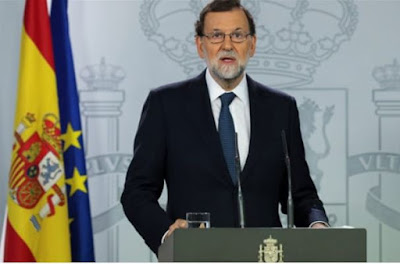Spanish Prime Minister Mariano Rajoy
Spanish Prime Minister Mariano Rajoy on Wednesday took the first
step towards activating article 155 of the constitution, that would
allow him to suspend Catalonia's political autonomy and take over the
region.
Catalan regional president Carles Puigdemont said late on Tuesday
that he would proceed with the secession but would suspend it for a few
weeks to facilitate negotiations.
Madrid has given little indication it is willing to talk.
"The cabinet has agreed to require formally to the Catalan government to confirm whether it has declared or not independence," Rajoy said in a televised address.
"The answer from the Catalan president will determine future events, in the next few days," he also said, adding he would keep acting in a "cautious and responsible" way.
This formal requirement is needed to trigger the article 155 though
the constitution does not establish any specific time-frame for the
answer. As part of the Article 155, the central government can take some
or total control of any of its 17 regions if they don't comply with
their legal obligations.
In a highly anticipated speech on Tuesday, Puigdemont had said that
the landslide victory in a disputed October 1 referendum gave his
government in the regional capital, Barcelona, the grounds to implement
its long-held desire to break century-old ties with Spain.
But he proposed that the regional parliament suspend the effects of
the declaration to commence a dialogue and help reduce tension.
Spanish Deputy Prime Minister Soraya Saenz de Santamaria said the Catalan leader "doesn't know where he is, where he is going and with whom he wants to go'.
She said Puigdemont had put Catalonia "in the greatest level of uncertainty seen yet".
About 2.3 million Catalans - or 43 percent of the electorate in the
northeastern region - voted in the referendum. Regional authorities say
90 percent were in favour and declared the results valid.
Rajoy's government had repeatedly refused to grant Catalonia
permission to hold a referendum on the grounds that it was
unconstitutional, since it would only poll a portion of Spain's 46
million residents.
Catalonia's separatist camp has grown in recent years, strengthened
by Spain's recent economic crisis and by Madrid's rejection of attempts
to increase self-rule in the region.
The political deadlock has plunged Spain into its deepest political
crisis in more than four decades, since democratic rule was restored
following the dictatorship of General Francisco Franco.


No comments:
Post a Comment